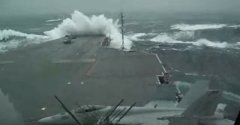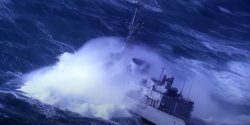You are using an out of date browser. It may not display this or other websites correctly.
You should upgrade or use an alternative browser.
You should upgrade or use an alternative browser.
CV-18 Fujian/003 CATOBAR carrier thread
- Thread starter Jeff Head
- Start date
No one will sail into a typhoon unless there is no alternatives. Any captain of a ship that sailed into a typhoon despite having alternatives probably will lose his job. The approaching routes of a typhoon in SCS can be tracked and forecast easily 1 week ahead of its arrival.
Damaged EO sensors can be repaired on the ship's workshops, and I am sure there are replacement parts in the ship's stores.
Don't see why that would be a problem ...
EO balls survive on helos/aircrafts at speed approaching or exceeding Force 5 storms and if it's raining, that'd be equal to a Typhoon.
EO balls are just as exposed on DDG/FFGs right atop the bridge. I'd daresay the flight deck/catwalk levels are equal or higher than bridge on a 3-5k ton ship.
Yup.
Agree that no one will coconsciously put their ship at risk...but sometimes (especially during wars) despite best intentions/planning, your get this on your bow:

Not a direct proof, but there shouldn't be a question for heavy duty drones used by professional camera filming to do the job.Is there actually proof that those pics are taken by a DJI launched from Fujian? It's not easy to take off any fly a quadrotor from a fast moving ship along with whatever wind condition there is on the sea.
Here is DJI Matrice 600 pro.
Max Wind Resistance 8 m/s
Max Speed 40 mph / 65 kph (no wind)
I suppose the wind resistance is the relative wind speed for takeoff which is 16 knots, a good cruising speed of the ship. The top speed is 35 knots.
In the year 2000 there was a historian that asked a group of American engineers to list the top 20 greatest American engineering accomplishments of the last 100 years.I think nuclear is more trouble than worth, .......
China may eventually build Nuclear carriers for bragging rights purposes and showing that they have caught up to US in naval technology. But other than that I see no extra strategic value to having Nuclear Carriers.
Number 2 on the list was - The mass production of the automobile and thus (the invention of affordable cars) which revolutionized transportation.
In the year 2100 there will be a historian that will ask a group of Chinese engineers to list the top 20 greatest Chinese engineering accomplishments of the last 100 years.
Number 2 on the list will be - The mass production of nuclear reactors and thus (the invention of affordable nuclear power) which will revolutionize the energy sector.
but that's a separate topic...
just talked about difference between CV and CVNNuclear power is like an extremely large fuel tank that lasts 20 years. Nuclear fuel contains more energy per KG compared to Oil. But that is pretty much the only difference. They could also be more expensive, more risky, and more heavy.
Add 2-3 extra tankers to your fleet per carrier, and then you solve the carrier endurance problem and thus no longer need nuclear carriers. I think nuclear is more trouble than worth, especially in the modern battlefield when carriers are vulnerable to getting sunk by missiles. So, it might be better to have conventional carriers that are cheaper, easier to maintain and even smaller to distribute the navy more.
China may eventually build Nuclear carriers for bragging rights purposes and showing that they have caught up to US in naval technology. But other than that I see no extra strategic value to having Nuclear Carriers.
In the year 2000 there was a historian that asked a group of American engineers to list the top 20 greatest American engineering accomplishments of the last 100 years.
Number 2 on the list was - The mass production of the automobile and thus (the invention of affordable cars) which revolutionized transportation.
In the year 2100 there will be a historian that will ask a group of Chinese engineers to list the top 20 greatest Chinese engineering accomplishments of the last 100 years.
Number 2 on the list will be - The mass production of nuclear reactors and thus (the invention of affordable nuclear power) which will revolutionize the energy sector.
but that's a separate topic...
Rather than mass affordable nuclear, it's more likely to be solar.
Today, Chinese nuclear electricity is still only at cost parity with coal. In comparison, solar electricity today is typically 3x cheaper. This is already revolutionising the electricity sector.
antiterror13
Brigadier
Rather than mass affordable nuclear, it's more likely to be solar.
Today, Chinese nuclear electricity is still only at cost parity with coal. In comparison, solar electricity today is typically 3x cheaper. This is already revolutionising the electricity sector.
And it will get cheaper over time, still improving, not matured yet
Yup.
Agree that no one will coconsciously put their ship at risk...but sometimes (especially during wars) despite best intentions/planning, your get this on your bow:
View attachment 129380
As mentioned, it happens to the EO balls on smaller ship as well.

So either it's a non-issue cos these balls are built tough or it happens rarely enough that it's deemed an acceptable risk. (or both)
Is there a displacement value somewhere in there?
Edit: image recognition and translation combo mentions 30 cities and 80 000 pieces of glass. Wtf? I get that may be 30 knots and 80000 t but still...
Last edited:
As mentioned, it happens to the EO balls on smaller ship as well.
View attachment 129412
So either it's a non-issue cos these balls are built tough or it happens rarely enough that it's deemed an acceptable risk. (or both)
Obviously much more often than a carrier with a freeboard of six stories!
